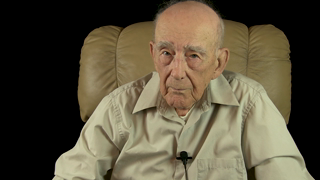2:38 | It was a hard lesson. Walter Marshall learned it in the Marines in the Pacific. Don't get too close to anyone. That meant that he, and anyone else in the unit who'd learned that lesson, was alone in a crowd. And in the middle of combat, any one of these solitary warriors could arise to the occasion.
Keywords : Walter Marshall Tarawa Saipan

He was ready for the Marines after a disciplined, patriotic upbringing, a stern principal at his school and training in the National Guard. Walter Marshall was also influenced by movies about the Marines, especially the uniforms. When war broke out, he was already aware of conditions in Europe, as told to him by Jewish friends.
Marine recruit Walter Marshall left the cold of New York for sunny San Diego and boot camp. It was tough, but he loved it because he was already used to discipline. His first stop in the Pacific was New Zealand, where he was treated wonderfully by the locals. It was a good life there, but the men knew what they were headed for.
Tarawa was an atoll that had a fishing and coconut oil operation before the war. After 76 hours of US Marines versus entrenched Japanese, there was not much standing. Walter Marshall was lucky enough to come in on an amphibious tractor. Most had to wade through hundreds of yards of coral reef. Once ashore the enemy had to be removed from fortified pillboxes and spider traps.
The Japanese defenders on Tarawa were very good soldiers, Imperial Marines experienced in Manchuria. They would rather commit suicide than surrender and hundreds did. Walter Marshall hated them during the war, but time has changed his perspective. Not long after it was declared that organized resistance had ceased, he was shot through the thigh and had to be evacuated. Before that happened, he got to see the heroic actions of future movie star, Eddie Albert, a Navy Ensign at the time.
After the hard fought battle of Tarawa, Walter Marshall trained in Hawaii for the next operation, the invasion of Saipan. Once again, it was chaotic, with units split up and men moving up into leadership when called upon. This was a big advantage over the Japanese with their rigid command structure.
The men headed to Saipan were already on edge, especially the Marines who had participated in the previous invasion of Tarawa. Then, as they waited on board ship in the dark, someone dropped a grenade. Having survived that, they next faced a very difficult task, going over the side and down a rope net to board bobbing and heaving Higgins boats.
As he readied for the next operation on Tinian, Walter Marshall received the word that he had enough points to go home. He was carrying a bullet in his leg and had a fractured vertebra and the latter condition was destined to plague him for a long time. Determined to make a better life for his children, he ignored the pain and worked on.